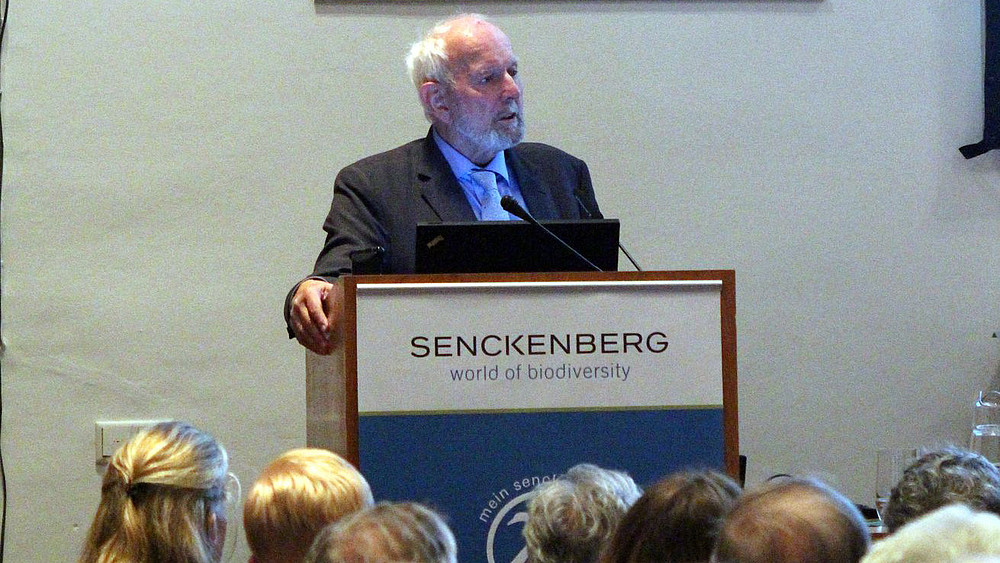The Rector raffled off limited tickets for the lecture with Ernst Ulrich von Weizsäcker. Winners report about it.

On 27.04.2018, the Public Relations Office launched a raffle on behalf of the Rector, which met with immense interest. The object of desire: two tickets each for the Humboldt Lecture on 3 May 2018 at the Senckenberg Museum of Natural History in Görlitz. Rector, Prof. Friedrich Albrecht, had sponsored 25 of these exclusively limited tickets.
The renowned environmental and futurologist Prof. Dr. Ernst Ulrich von Weizsäcker presented the new Club of Rome report as part of the Humboldt Lecture. "The Full World Demands a Fundamental Rethink" was the title of his lecture, in which he addressed the effects of global population growth.
Here, two lucky winners of the prize draw report on the event.
I usually get regular messages telling me that I've won something. I'm entitled to cars, money and vacations in faraway countries; all I have to do is transfer a small handling fee in advance or provide my credit card number. So it was all the more pleasing that the HSZG Public Relations team informed me that I had won two tickets for the lecture by Prof. Dr. Ernst Ulrich von Weizsäcker. As part of the Humboldt Lectures, the Senckenberg Museum had invited the renowned member of the Club of Rome to give a lecture entitled "The full world demands a fundamental rethink".
So I quickly asked a fellow student if she wanted to come along and as she didn't have to be asked twice, Thursday was quickly planned.
The event was completely sold out and the hall was completely full. We quickly greeted the other fellow students and the well-known professors of the HSZG and then, after a brief introduction to Mr. von Weizsäcker, the lecture began.
In a nutshell, there is a point in history when the consumption of resources by mankind has increased sharply and the world population has risen sharply at the same time. Since the 1950s, we have been living in a "full world", with so many natural resources being consumed that the earth can no longer cope. Agriculture, mining, fishing and livestock farming have increased to such an extent that the natural environment has been destroyed and displaced. The consequences are not yet fully foreseeable, but this trend should be countered today. The problem: patterns of thought and trust in the economy have been shaped by theorists and philosophies that are not necessarily wrong, but which assume an "empty world". In today's "full world", maximizing economic growth cannot be the solution, as this requires additional resources that are no longer available. A rethink is necessary.
But not everything is hopeless yet. According to Mr. von Weizsäcker, there are ways out. Increasing the efficiency of wind power plants to generate electricity is just one example. Other production methods for paper, the development of some areas of Copenhagen into car-free zones and new recycling methods offer hope, they just have to be implemented consistently.
It is difficult to fit the entire presentation into a few lines if you are interested in the subject: The Club of Rome also publishes its findings in books, which are also available in German.
At the end there was a short Q&A session with the opportunity to speak to Mr. von Weizsäcker personally.
The lecture ended at around 8 p.m. and we used the evening to discuss what we had heard again in a bar.
It was an extremely interesting lecture and I am grateful that the HSZG made this evening possible for me by raffling off the tickets, as the performance was sold out very quickly.
"It's our turn" - A title with two meanings: 1. it's our turn to act and 2. we are about to plunge ourselves into the abyss. Prof. Dr. Ernst Ulrich von Weizsäcker, Co-President of the Club of Rome, presented the Club of Rome's new report to the audience of the Humboldt Lecture on May 3 at the Senckenberg Museum in Görlitz. It was a very exciting three quarters of an hour, which certainly gave one or two visitors to the sold-out event food for thought.
We live in a crowded world! The first part of the lecture began in a very drastic and stirring way. People are living beyond the earth's ecological carrying capacity. This cannot be good in the long term. According to the Club of Rome, which is calling for a fundamental rethink and a new enlightenment. Because with today's lifestyle and constant growth, we are destroying humanity itself.
Global institutions are constantly talking about sustainability. However, even the implementation of the 17 UN sustainability goals, with the exception of three goals, tend to be the opposite. Global warming, overexploitation of resources and population development - these were recurring keywords in the lecture.
In the required new enlightenment - which made up the second part of the Humboldt Lecture - it should no longer be "more and more and more", but rather "maintain a balance". What is meant is the creation of a healthy balance between man and nature, speed and stability, fairness and performance incentives and so on.
Sensible and intelligent management with the help of technical inventions and science can help us to make a difference. Selfish thinking should be overcome. A so-called regenerative economy was explained by Prof. Dr. Weizsäcker as one approach, along with many other ideas for solutions. Showcase examples were also mentioned in which companies have already been able to record an increase in value despite turning away from the classic idea of growth.
All in all, it was a successful event that presented the new Club of Rome report briefly and concisely and encouraged a rethink. The discussion questions following the lecture testified to the broad interest of the audience in the topic.
Photos: Gitschmann, Senckenberg